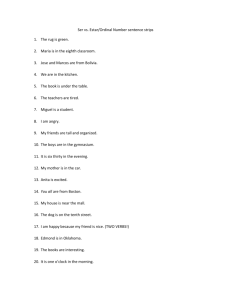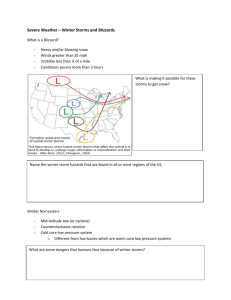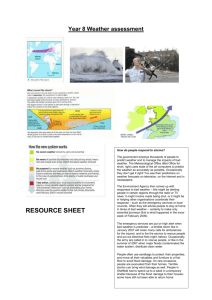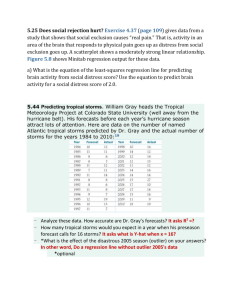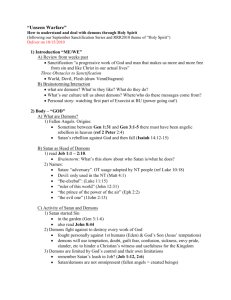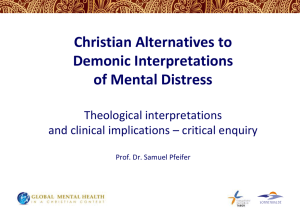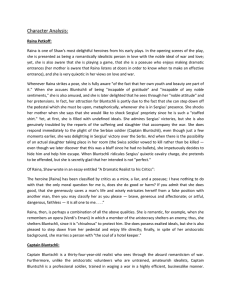Boundaries and Bridges - Holy Myrrhbearers Monastery
advertisement
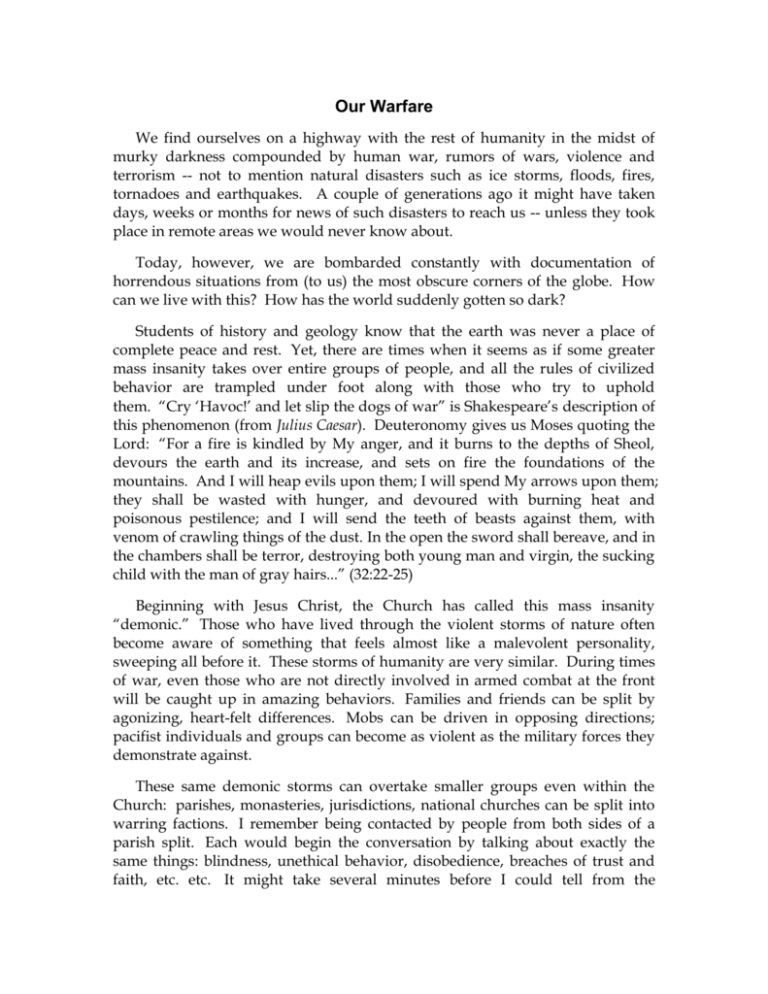
Our Warfare We find ourselves on a highway with the rest of humanity in the midst of murky darkness compounded by human war, rumors of wars, violence and terrorism -- not to mention natural disasters such as ice storms, floods, fires, tornadoes and earthquakes. A couple of generations ago it might have taken days, weeks or months for news of such disasters to reach us -- unless they took place in remote areas we would never know about. Today, however, we are bombarded constantly with documentation of horrendous situations from (to us) the most obscure corners of the globe. How can we live with this? How has the world suddenly gotten so dark? Students of history and geology know that the earth was never a place of complete peace and rest. Yet, there are times when it seems as if some greater mass insanity takes over entire groups of people, and all the rules of civilized behavior are trampled under foot along with those who try to uphold them. “Cry ‘Havoc!’ and let slip the dogs of war” is Shakespeare’s description of this phenomenon (from Julius Caesar). Deuteronomy gives us Moses quoting the Lord: “For a fire is kindled by My anger, and it burns to the depths of Sheol, devours the earth and its increase, and sets on fire the foundations of the mountains. And I will heap evils upon them; I will spend My arrows upon them; they shall be wasted with hunger, and devoured with burning heat and poisonous pestilence; and I will send the teeth of beasts against them, with venom of crawling things of the dust. In the open the sword shall bereave, and in the chambers shall be terror, destroying both young man and virgin, the sucking child with the man of gray hairs...” (32:22-25) Beginning with Jesus Christ, the Church has called this mass insanity “demonic.” Those who have lived through the violent storms of nature often become aware of something that feels almost like a malevolent personality, sweeping all before it. These storms of humanity are very similar. During times of war, even those who are not directly involved in armed combat at the front will be caught up in amazing behaviors. Families and friends can be split by agonizing, heart-felt differences. Mobs can be driven in opposing directions; pacifist individuals and groups can become as violent as the military forces they demonstrate against. These same demonic storms can overtake smaller groups even within the Church: parishes, monasteries, jurisdictions, national churches can be split into warring factions. I remember being contacted by people from both sides of a parish split. Each would begin the conversation by talking about exactly the same things: blindness, unethical behavior, disobedience, breaches of trust and faith, etc. etc. It might take several minutes before I could tell from the conversation which side of the split this particular person was on. Each side saw the other as being what St. Paul described in 2nd Thessalonians: “Therefore God sends upon them a strong delusion, to make them believe what is false...” (2:11) In the middle of such conflicts, phrases such as “He/she is crazy!” “They have to be insane!” “How can any normal person possibly believe/do/say that!” are frequently heard. People feel driven by their honor to defend what appear to them to be life-and-death situations. And in truth, such situations exist. It has not been better when people have “refused to get involved” and turned a blind eye to the systematic genocide of Stalin, Hitler and others, thus becoming passive accomplices in the murders of millions of people. “Am I my brother’s keeper?” is a question that has been asked down the millennia. Yet St. Paul reminds us: “we are not contending against flesh and blood, but against the principalities, against the powers, against the world rulers of this present darkness, against the spiritual hosts of wickedness in the heavenly places. Therefore take the whole armor of God, that you may be able to withstand in the evil day, and having done all, to stand. Stand therefore, having girded your loins with truth, and having put on the breastplate of righteousness...” (Ephesians 6:14) Many of us know that it is far easier to sit back and analyze what seems to us to be the insane or criminal behavior of others than to deal with our own personal demons. The fight is not less intense; the psychic pain can in fact be greater. Yet unless we are willing to face and fight our own personal demons, we may well become the people the Lord speaks about in Luke’s Gospel: “ Or how can you say to your brother, ‘Brother, let me take out the speck that is in your eye,’ when you yourself do not see the log that is in your own eye? You hypocrite, first take the log out of your own eye, and then you will see clearly to take out the speck that is in your brother’s eye.” (6:42) A review of Father Alexander Webster’s book, The Pacifist Option: The Moral Argument Against War in Eastern Orthodox Theology, states: “In the Church there are two accepted paths that one may take in the face of violence: One, the path of radical pacifism, characterized by the moral virtues of non-violence, nonresistance, voluntary kenotic suffering, and universal forgiveness...” The other path is described in two essays published in Paris in 1929 in St. Sergius Leaflets. After pointing out that a surprisingly large proportion of the saints and willing martyrs for Christ have been soldiers and military officers, it states: “The armed forces of Byzantium gave any talented and brave man the opportunity -given some luck -- to make a career, but they provided something else as well: Its hardness and severe discipline were rooted in the great and deep ideals of patriotism, self-sacrifice, duty and religious feeling which, even if misguided, are still planted in the soul of man by God.” (...) “When defending the state, the Christian soldiers raised their threatening swords, yet these experienced fighters would not even raise their unarmed hands to defend themselves.” St. Pachomius, recognized as one of the first founders of communal monasticism in the fourth century, became a Christian while a soldier in the Roman imperial army. He went on to plant the same ideals which produced so many military martyrs, in the hearts of his monastics. Only those willing to strive with themselves first, to subdue their own demons through prayer, fasting, obedience and the other disciplines of the ascetic life, can be true soldiers for Christ in any arena. But can Christians today even in monasteries, let alone parishes, hope to take on such asceticism? The answer to this question could be an entire essay in its own right. Here, let us just say that the answer is yes, if we are willing to make choices -- and look at the choices that we already live with, often unconsciously. We choose daily to submit to the demands of the media around us, from computers and televisions on down to Muzak and video games; we choose to say that the demands of our frenetic society are more important than our life in the Church. It is not lack of ability that keeps us from becoming saints, it is the inability to see that we have choices; that no one holds a gun to our head to force us to sit at the computer or in front of the television for ridiculously long hours or to stay away from time with our families and children or to avoid gathering as the people of God. We need balance in our lives, so we can use our technology and enjoy our society, not be taken over by them. May we so strive that we may be free to answer God’s call to sanctity, whether it lead us through the ways of peace beginning with those who surround us, or whether it be at least during some periods of our lives, the way of public service, including “military service, the essence of which is not to kill but to offer one’s life as a sacrifice for one’s society, killing enemies merely out of necessity, for we are of God, and the whole world is in the power of the evil one.” (1 Jn. 5:19) (quote from St. Sergius Leaflets, Paris , 1929) Note: I am indebted to the website www.incommunion.org for The St. Sergius Leaflets and the review of Father Webster’s book.



